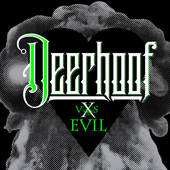
Deerhoof
Deerhoof vs. Evil
(Polyvinyl; 2011)
By Mark Abraham | 10 January 2011
Me: unrepentant, gushing fan of the brilliant Deerhoof, even when I’ve been less than satisfied with whatever given album they’ve recently put out (Milk Man [2004] and Friend Opportunity [2007]). I have been this kind of fan for three reasons, basically: the band’s willingness to regurgitate pop-tropes like shadow puppets, gifted inside a decidedly un-pop aesthetic; their unabashed re-articulation of ’70s and ’80s guitar histrionics, most recently with dual 12-string guitars, into a delivery that can only be described as “cute”; and their seeming effortless ability to find moments of beauty in their own oddball approach to music.
Okay: Deerhoof has always been a weird band. But that’s not really a developed enough characterization, right? They’re weird without actually being particularly weird: for example, their albums feature ballsy rock tracks, pop songs, and ballads; they have a knack for melody almost unparalleled in contemporary indie rock; and on their best albums (Reveille [2002], Apple O’ [2003], The Runners Four [2005], and Offend Maggie [2008]) they manage to shoehorn their bass-heavy off-kilter pop sensibilities into traditional album format. And no matter how loud, brash, or chaotic they sound, the band has astoundingly been able to maintain a grasp on their central theme: a giddy, ebullient, joyous embrace of sound. Deerhoof is the most precise chaos ever, I mean, delivered with a smile so wide it seems kind of awkward.
All that praise has always been mitigated by one thing: the band’s inability to deliver an album so overwhelming that it existed, legacy-wise, outside the aesthetic Deerhoof has made their niche. Reveille comes close, neutered only by the similarities between tracks, and as I mentioned in my review of Offend Maggie, the band was definitely firing on all cylinders, but true brilliance, I thought at the time, sort of lay in a hybrid between the two: the snickering experimental impulses of Reveille shaded by the intricate and brash arrangements of the guitar-heavy Offend Maggie. That, I thought, would be perfect Deerhoof.
I wasn’t quite wrong, but here’s the thing: Deerhoof vs. Evil isn’t quite that amalgamation, even though it is Deerhoof’s classic, finally. And further, it’s not just that this new album is Deerhoof’s most consistent album: tracks like “Behold a Marvel in the Darkness,” “Super Duper Rescue Heads,” “Secret Mobilization,” and “Must Fight Current” stand head to head with the best of the band’s back catalogue: say “Panda Panda Panda,” or “Punch Buggy Valves,” or “Buck and Judy.” Further further, this also happens to be Deerhoof’s most unabashedly experimental album, as if settling into the new dual guitar setup formed for Offend Maggie has let the band relax and stop worrying about how, exactly, they’ll pull this stuff off on stage. Because if Offend Maggie was pared down precisely to allow Deerhoof to tour with a small setup—a fact verified when I saw them not so long ago on tour—Deerhoof vs. Evil shirks those restraints entirely. The studio wankery that plagued Friend Opportunity is here transformed into something organic, natural, and essential to the Deerhoofian sound—the grinning vignettes that slide into the main portion of opener “Qui Dorm, Nomes Somia” echo Satomi Matsuzaki’s vocal lines; they are complementary, in other words, and not slopped over top. And I think that reality is just the result of a band that has become very comfortable with themselves.
Now: comfortable with themselves. Deerhoof vs. Evil is not an album that itself sounds comfortable; it is not meek, or relaxed. The band’s ability to play grit and slap stick against one another has never been more apparent than here. This is a set of songs that masterfully takes all past elements of the Deerhoof aesthetic and balances them perfectly; the ease and confidence with which these songs are delivered is, in other words, palpable. A statement which would be fairly academic if the songs weren’t also fucking awesome. Take “Super Duper Rescue Heads,” which places a spate of undulating drum-heavy instrumental bits around a basic vocal verse structure. Greg Saunier’s drumming is always fantastic, but when he explores the textures and tones of his kit (like a mini-Han Bennink tribute) he becomes even more exciting.
I dunno—Deerhood vs. Evil is just simultaneously astounding and utterly familiar, correct, and right. Maybe it’s the years of hard work the members of this band have put in, or maybe it’s the several album’s worth of victories, mistakes, and aesthetic refining, but I’m just so glad because Deerhoof, fighting evil or not, deserves to have this kind of album: brilliant, ebullient, masterful, and trenchant. This is Deerhoof as a tangible thing, I mean, snaking outwards to redefine music rather than standing off to the side as a self-proffered alternative. Just gorgeous, I mean, and excepting that ludicrous cover, this rating was never in question.





